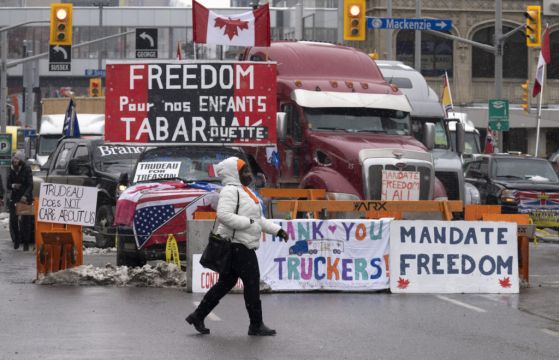Canadian politicians have expressed increasing worry about the economic effects of disruptive demonstrations after the busiest border crossing between the US and Canada became partially blocked by truckers protesting vaccine mandates.
The blockade at the Ambassador Bridge between Detroit and Windsor, Ontario, prevented traffic from entering Canada while some US-bound traffic was still moving, public safety minister Marco Mendicino said, calling the bridge “one of the most important border crossings in the world”. It carries 25% of all trade between Canada and the US.
Canadian transport minister Omar Alghabra said such blockades will have serious implications on the economy and supply chains.
“I’ve already heard from automakers and food grocers. This is really a serious cause for concern,” he said.

Mr Mendicino added: “Most Canadians understand there is a difference between being tired and fatigued with the pandemic and crossing into some other universe.”
Speaking in an emergency debate late on Monday in Parliament, prime minister Justin Trudeau said the protesters are “trying to blockade our economy, our democracy”.
Auto parts and other goods were still flowing across the border on Tuesday evening, despite the bridge delays.
But trucks had to travel almost 70 miles north to the Blue Water Bridge connecting Sarnia, Ontario, to Port Huron, Michigan. Authorities at that bridge reported a nearly three-hour delay for trucks to cross. In total, the trip will take more than five hours longer than normal.
Protesters also closed another important US-Canada border crossing in Coutts, Alberta.
The daily demonstrations staged by the so-called Freedom Truck Convoy are centred in Ottawa, where demonstrators have used hundreds of parked trucks to paralyse parts of the capital for more than 10 days. Protesters have said they will not leave until all vaccine mandates and Covid-19 restrictions are lifted.
Protest organisers have been calling for weeks for the removal of Mr Trudeau’s government, although most of the restrictive measures were put in place by provincial governments.

On Tuesday, the organisers withdrew an unlawful demand that the nation’s governor general, the representative of Britain’s Queen Elizabeth II as head of state, force federal and provincial governments to lift all Covid-19 restrictions, including vaccine mandates. They now say they support Canada’s constitution and the democratic process.
Francois Laporte, the president of Teamsters Canada, which represents over 55,000 drivers, including 15,000 long-haul truckers, said the protests do not represent the industry in which 90% of drivers are vaccinated.
The Freedom Convoy “and the despicable display of hate led by the political Right and shamefully encouraged by elected conservative politicians does not reflect the values of Teamsters Canada, nor the vast majority of our members,” Mr Laporte said in a statement.
Ottawa’s city manager said all tow-truck companies on contract with the city have refused to haul away the big rigs.
Joel Lightbound, a member of Mr Trudeau’s Liberal Party, rebuked his leader for dividing Canadians and said his government needs to create a road map for when coronavirus measures should be lifted.
“It is time we stopped dividing people, to stop pitting one part of the population against each other,” Mr Lightbound said on Tuesday.
Mr Trudeau said everyone is tired of Covid-19, and that the restrictions will not last forever. He noted that Canada has one of the highest vaccination rates in the world.
He said on Tuesday: “This government has been focused every step of the way on following the best science, the best public health advice, to keep as many people as safe as possible. Frankly, it’s worked.”







